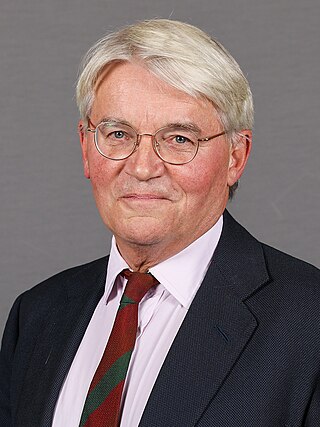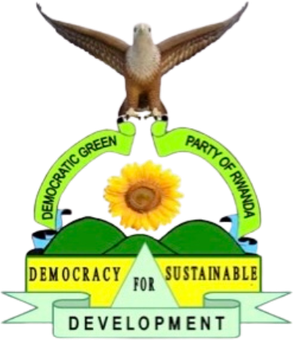
Sheikh Mussa Fazil Harerimana is a Rwandan politician, currently a member of the Chamber of Deputies in the Parliament of Rwanda. [1]

Sheikh Mussa Fazil Harerimana is a Rwandan politician, currently a member of the Chamber of Deputies in the Parliament of Rwanda. [1]

Rwanda, officially the Republic of Rwanda, is a landlocked country in the Great Rift Valley of Central Africa, where the African Great Lakes region and Southeast Africa converge. Located a few degrees south of the Equator, Rwanda is bordered by Uganda, Tanzania, Burundi, and the Democratic Republic of the Congo. It is highly elevated, giving it the soubriquet "land of a thousand hills", with its geography dominated by mountains in the west and savanna to the southeast, with numerous lakes throughout the country. The climate is temperate to subtropical, with two rainy seasons and two dry seasons each year. It is the most densely populated mainland African country; among countries larger than 10,000 km2, it is the fifth-most densely populated country in the world. Its capital and largest city is Kigali.

Rwanda is a de facto one-party state ruled by the Rwandan Patriotic Front and its leader Paul Kagame since the end of the 1994 genocide against members of the Tutsi ethnic group. Although Rwanda is nominally democratic, elections are manipulated in various ways, which include banning opposition parties, arresting or assassinating critics, and electoral fraud.

Kigali is the capital and largest city of Rwanda. It is near the nation's geographic centre in a region of rolling hills, with a series of valleys and ridges joined by steep slopes. As a primate city, Kigali is a relatively new city. It has been Rwanda's economic, cultural, and transport hub since it was founded as an administrative outpost in 1907, and became the capital of the country at independence in 1962, shifting focus away from Huye.

Paul Kagame is a Rwandan politician and former military officer who has been the President of Rwanda since 2000. He was previously a commander of the Rwandan Patriotic Front (RPF), a rebel armed force which invaded Rwanda in 1990. The RPF was one of the parties of the conflict during the Rwandan Civil War and the armed force which ended the Rwandan genocide. He was considered Rwanda's de facto leader when he was Vice President and Minister of Defence under President Pasteur Bizimungu from 1994 to 2000 after which the vice-presidential post was abolished.

Andrew John Bower Mitchell is a British politician serving as Shadow Foreign Secretary since July 2024. He previously served as Deputy Foreign Secretary between February and July 2024 and Minister of State for Development and Africa between October 2022 and July 2024 respectively. A member of the Conservative Party, he has served as the Member of Parliament (MP) for Sutton Coldfield since 2001 and previously served as the MP for Gedling from 1987 to 1997. Mitchell served in the Cabinet as Secretary of State for International Development from 2010 to 2012 and then briefly as Government Chief Whip in the House of Commons in late 2012.

The Rwandan genocide, also known as the genocide against the Tutsi, occurred between 7 April and 19 July 1994 during the Rwandan Civil War. During this period of around 100 days, members of the Tutsi minority ethnic group, as well as some moderate Hutu and Twa, were killed by armed Hutu militias. Although the Constitution of Rwanda states that more than 1 million people perished in the genocide, the actual number of fatalities is unclear, and some estimates suggest that the real number killed was likely lower. The most widely accepted scholarly estimates are around 500,000 to 800,000 Tutsi deaths.

The Chamber of Deputies is the lower house of the bicameral national legislature of Rwanda. It was created under the new Constitution adopted by referendum in 2003.

The Parliament of Rwanda has consisted of two chambers since 2003:

The upper house of the Parliament of Rwanda is the Senate (Sena/Sénat). The Senate has 26 members elected or appointed for eight-year terms: 12 elected by provincial councils, eight appointed by the President of the Republic to ensure the representation of historically marginalized communities, four by the National Consultative Forum of Political Organizations, and two elected by the staff of the universities. Additionally, former presidents can request to become a member of the Senate.

The Constitution of Rwanda was adopted by referendum on May 26, 2003. It replaced the Constitution of 1991.
Prostitution in Rwanda is illegal in all aspects. Prostitutes, clients and any involved third parties are criminalised by the country's Penal Code. However, a draft of a new Penal Code that does not prohibit prostitution was presented for debate in the Rwandan Parliament in December 2017.

The Democratic Green Party of Rwanda is a green political party in Rwanda, established in 2009. The party was registered in August 2013, but too late to contest the 2013 parliamentary elections. Its platform emphasizes unity, non-violence, social justice, participatory democracy, and calls for subsidized prices for agricultural produce. It believes that the unalienable rights of the people include "the right to life, liberty, peaceful assembly, expression, worship and the pursuit of happiness", and that these rights are granted by God.

India–Rwanda relations are the foreign relations between the Republic of India and the Republic of Rwanda. India is represented in Rwanda through its High Commission in Kigali which opened on 15 August 2018. Rwanda has been operating its High Commission in New Delhi since 1999 and appointed its first resident High Commissioner in 2001.
This electoral calendar for the year 2003 lists the national/federal direct elections to be held in 2003 in the de jure and de facto sovereign states. By-elections are excluded, though national referendums are included.
The following lists events that happened during 2008 in Rwanda.
As of 2018, the African country Rwanda ranks in the top five countries for gender equality according to the Global Gender Gap Report. The idea of fairness that dominates this country arose after the genocide against the Tutsi that occurred in 1994. The government is committed to ensuring equal rights for women and men without prejudice to the principles of gender equality and complementarity in national development. These ideas are exhibited through the roles of Rwanda women in government, the respect for women's education and the role of women in Rwanda healthcare. The country also took an active stance against rape in genocide, created a national action plan after United Nations Resolution 1325, and is pushing towards ending gender-based violence.
The Rwanda Revenue Authority (RRA) is a government revenue collection agency established by the Parliament of Rwanda. The RRA is charged with enforcing, assessing, collecting, and accounting for the various taxes imposed in Rwanda.

Donatille Mukabalisa is a Rwandan lawyer and politician, notably the Speaker of the Chamber of Deputies. She was elected Speaker of the Rwandan parliament in 2013 after the country's national elections.

Parliamentary elections were held in Rwanda on 3 September 2018, with Rwandan overseas voting the day before. The result was a victory for the Rwandan Patriotic Front coalition, which won 40 of the 53 elected seats while losing its absolute majority over the total of seats, whilst the Democratic Green Party and Social Party Imberakuri both entered parliament for the first time. With 49 of the 80 seats in the newly elected parliament held by women (61%), the elections maintained Rwanda's position as the country with the highest proportion of female MPs.